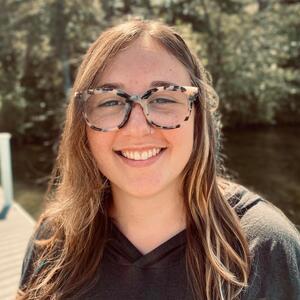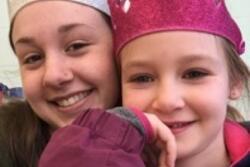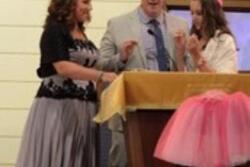Where Are They Now? RVF Alum Emma Mair
JWA chats with Emma Mair, a rabbinical student at Hebrew College and a Jewish educator. Emma participated in the fifth cohort of JWA’s Rising Voices Fellowship (RVF), which is celebrating its tenth anniversary.
JWA: Tell us about your experience participating in the fifth cohort of RVF in 2017-2018.
Emma Mair: I loved everything about my experience. I grew up as one of the few Jews in my class, and so it was incredibly nourishing for me to be in a community like my RVF cohort. We had the opportunity to explore so many issues together and to share in each other’s growth as writers, activists, and Jews. We became a very tight-knit group. I remember sitting up all night talking during our retreats. We talked about everything: crushes, politics, recipes, revolution, etc. We inspired each other in so many ways, and it was so rewarding to be a part of.
JWA: What were the impacts of RVF on your high school self?
EM: I don’t think I would be who I am today if it weren’t for the impact RVF had on me. RVF helped me develop my own voice as both a writer and as a person. Not only did I learn how to speak up, I learned that I had important things to say. Having a community like my RVF cohort was also a necessary refuge from my teenage life. I’m so thankful I had my trusted RVF friends to help me navigate the challenges of my everyday life and the world in 2017-2018.
JWA: How has RVF continued to influence you as an adult?
EM: Beyond writing skills, RVF helped me develop networking skills, learn the ins and outs of Jewish American life, pitch ideas, give and receive constructive feedback, and so much more. These are all skills that I use every day as an adult. Sometimes I wonder where I might have learned those skills if it weren’t for RVF. Also, as a growing spiritual leader and educator, I think a lot about the pedagogy and immersive experiences I had the opportunity to participate in when I was in RVF. Today, I strive to create those safe and welcoming spaces where young Jews can talk about challenging issues, celebrate their identities, and grow in a circle of friends.
JWA: Can you talk about the RVF alum programming you organized for JWA?
EM: After my time as a fellow, I became the RVF alum coordinator [from 2018-2021]. I was in charge of keeping the lines of communication open between RVF alums after they'd moved on from the program. This was an important resource for many of us as we toured colleges, applied for internships, submitted articles, and simply existed as Jewish feminists. We ended up getting a grant from the Hadassah Foundation to build a joint alum network with jGirls, so I became the Co-Director of the Jewish Feminist Alumnae Network. Audrey Honig (the jGirls rep) and I collaborated to organize programming that both jGirls and RVF alums could participate in, so we could strengthen the bonds of Jewish feminism across organizations. We hosted a couple of writing workshops, in-person coffee meet-ups, and networking workshops, among other things.
JWA: You’ve held many roles as a Jewish educator, including Hebrew school teacher and b’nai mitzvah tutor. What's important for you to instill in your students about Judaism?
EM: It’s important for me to instill in my students that Judaism is fun! It’s a whimsical and wild tradition that I truly believe has something for everyone, if we’re able to open our hearts and minds to it. No matter the age, ability, or Jewish background of my students, I hope to instill in them a sense of the utter joy Judaism can bring to their lives, regardless of how they may ultimately choose to interact with it. #jewishjoy
JWA: What kind of values and ideas do you hope to bring to future work as a rabbi?
EM: I think of the quote from Pirkei Avot, “On three things the world stands: on the Torah, on service/prayer, and on acts of lovingkindness." I believe that through accessible and meaningful engagement with our textual tradition and through nourishing and sustaining spiritual practices, we’ll be able to build up our capacity for treating each other as reflections of the Divine—with love and compassion— as well as for doing the sacred justice work our tradition obligates us to do.
JWA: What advice do you have for young people discovering their Jewish and feminist identities?
EM: Have sustainable wellness practices! Burnout is a real thing, and while the work will fill you up in so many ways, it also has the potential to tire you out. Not only is it okay to take care of your mental health and wellness needs, it’s absolutely necessary.
May you find strength in the work and nourishment in the tradition, and know that there are so many RVF alums cheering you on along the way!
This piece was written as part of JWA’s Rising Voices Fellowship.







